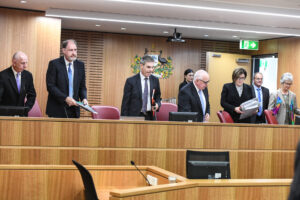Increases in the prices of commodities like oil and gas are not a reason for the RBA to raise interest rates next week
The latest monthly CPI figures out on Wednesday showed a slight increase in the annual growth of inflation, but policy director Greg Jericho writes in his Guardian Australia column that the Reserve Bank should not use it as an excuse to raise rates next week.
While CPI rose from 4.9% to 5.2%, the monthly figures can be quite erratic and thus it is best to also take note of the measure that excludes volatile items and holiday travel (which can exaggerate movement son a monthly basis). On this measure, annual inflation feel from 5.8% to 5.5%.
The big driver of inflation in August was a 9% jump in automotive fuel prices. And indeed much of the inflation over the past 2 years has come from overseas increases in world prices of commodities and of course companies taking advantage to increase profit margins.
The latest figures show that once again there is very little that the RBA can do to limit these price rises. While a higher exchange rate might ameliorate some of the increases, it is always foolish for the RBA to attempt to increase the value of the dollar by raising interest rates. Any changes in the value of the exchange rate due to another rate rise would likely be small and temporary.
The new Governor of the RBA, Michele Bullock should recommend the RBA board look through the monthly movements of the CPI and note that inflation here is following largely the same path as that in the rest of the OECD. Raising rates now would only serve to punish households for an increase in prices that had no link with wages or the level of demand in Australia economy.
You might also like
The continuing irrelevance of minimum wages to future inflation
Minimum and award wages should grow by 5 to 9 per cent this year
Want to lift workers’ productivity? Let’s start with their bosses
Business representatives sit down today with government and others to talk about productivity. Who, according to those business representatives, will need to change the way they do things?
Go Home On Time Day 2025. As full timers disconnect, part timers are doing more unpaid overtime
New research by the Centre for Future Work at The Australia Institute has revealed a disturbing new twist when it comes to unpaid overtime in Australia.


